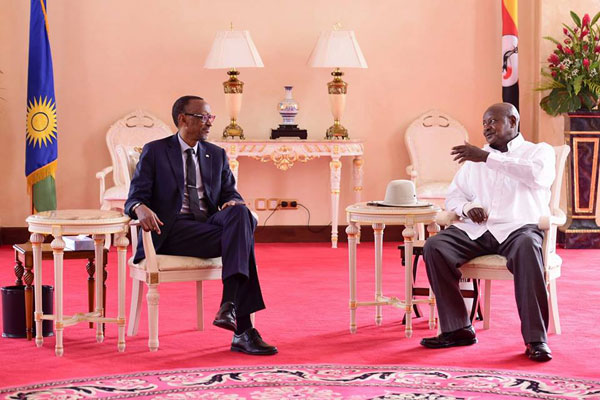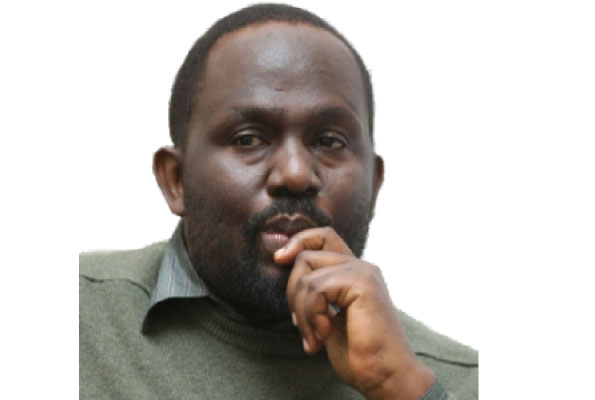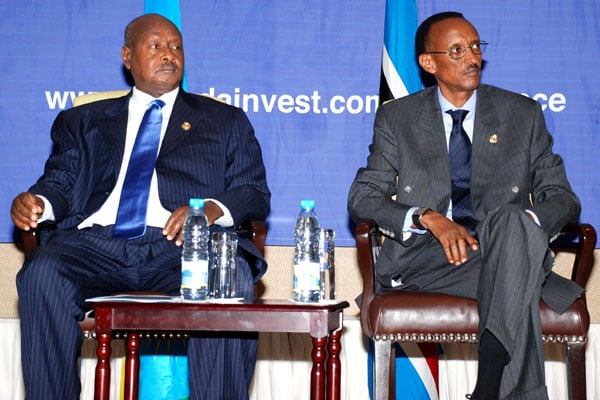Inside Entebbe meeting to repair Kampala, Kigali relations
What you need to know:
• The EastAfrican reports that President Kagame’s visit to Uganda was arranged on “a need to know basis,” with several Ugandan ministers whose dockets are in line with what the two leaders discussed kept in the dark about the March 25 meeting at State House Entebbe.
• Sources close to both governments reveal that the tensions “go beyond security concerns” and needed to be first handled “at the highest level.”
• Rwanda is reported to have accused Uganda of harbouring elements who want to destabilise the government.
The recent meeting between President Yoweri Museveni and his Rwandan counterpart Paul Kagame and public show helped to paper over the cracks, but sources reveal that beneath the speeches and official communiqué on joint infrastructure projects, the tensions continue to simmer between the two countries.
Just four days after hosting the African Union Summit on March 21, President Kagame — who is also the current AU Chairman — flew to Entebbe on a one-day official visit and held talks with his Ugandan counterpart, who had skipped the signing of the Continental Free Trade Area in Kigali.
But The EastAfrican has learnt that President Kagame’s visit was arranged on “a need to know basis,” with several Ugandan ministers whose dockets are in line with what the two leaders discussed kept in the dark about the March 25 meeting at State House Entebbe.
Related content
At the heart of the matter are Kigali’s fears that Uganda harbours elements that are bent on destabilising Rwanda, but sources close to both governments reveal that the tensions “go beyond security concerns” and needed to be first handled “at the highest level.”
The concerns are around the air transport for Rwanda national carrier whose operations around the region via Entebbe International Airport could be rendered difficult by Kampala’s refusal in January this year to adopt the Single African Air Transport Market agreement and to specifically grant Kigali Fifth Freedom rights over Entebbe International Airport.
Authorities in Kampala say granting those rights and signing the Single African Air Transport agreement would affect its plans to revive its own national carrier, a slow moving target so far but to which cabinet wants realised no matter the cost.
Kenya, Rwanda and Ethiopia — countries that operate vibrant national carriers in the region — signed the agreement along with 20 other African countries, while Uganda, Tanzania and Burundi did not, yet Kampala gave RwandAir fifth freedom traffic rights four years ago to pick up passengers from Entebbe to Juba.
Standard gauge railway
Equally, Kampala has also interpreted as spite the option by Kigali to build a standard gauge railway of AREMA [American Railway and Engineering and Maintenance-of-Way Association] technology, to connect with that of Tanzania, potentially making a white of elephant Uganda’s leg of SGR that is meant to connect with Rwanda, built to China Class 1 standard.
On its part Rwanda cannot understand why Kampala is moving so slowly on an electricity transmission line, the Kawanda—Birembo High Voltage Line to deliver highly needed power.
It is understood, that Kigali had even offered to pay for the line’s construction to counter Kampala’s claims it has no money to move at the speed Kigali wants.
Because of the sensitivity of these issues, The EastAfrican has established that even ministers who would be furnished with details of President Kagame’s visit were not briefed about it, despite the communiqué stating that the two heads of state “reviewed co-operation particularly in the sectors of railway and air transport as well as electricity interconnection”.
After their talks, the leaders addressed a joint press conference during which Mr Museveni said he did not see any fundamental conflict between Uganda and Rwanda but emphasised that there was need for close co-operation between the two countries’ intelligence services in order to get facts and secure the region.
Joint team
The EastAfrican could not establish the president’s immediate decisions on these matters, but according to the communiqué jointly presented by Uganda Foreign Affairs Minister Sam Kutesa and his Rwandan counterpart Louise Mushikiwabo, “the two heads of state agreed that the Joint Permanent Commission (JPC) between the two countries provides a good mechanism for discussing matters of mutual interest and strengthening co-operation.”
On this basis, the presidents directed their Foreign Affairs ministers to convene the next JPC within three months.
However, the grapevine in Kampala is also awash with the expulsion of Ugandan journalists, who were working for the Rwanda government-owned daily — New Times. The journalists were fired just days after President Kagame’s visit to Uganda.
During his visit, the Rwanda president said that concerned institutions in both countries “should get to the bottom of the matter because some issues were reported out of context” when responding to allegations that Ugandans in Rwanda were losing jobs.
While addressing journalists on April 6 in Kampala, Rwanda’s High Commissioner to Uganda Frank Mugambage also dismissed as wrong the allegations that Ugandans were targeted and fired due to the two countries strained relations.
As the two leaders work on smoothening their countries’ relations, President Museveni is to pay a state visit to Rwanda at his counterpart’s invitation.






